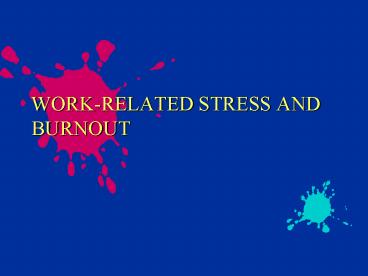WORK-RELATED STRESS AND BURNOUT - PowerPoint PPT Presentation
1 / 23
Title:
WORK-RELATED STRESS AND BURNOUT
Description:
WORK-RELATED STRESS AND BURNOUT Objectives Identify signs and symptoms of stress, reality shock, and burnout Describe the impact of stress, reality shock, and burnout ... – PowerPoint PPT presentation
Number of Views:398
Avg rating:3.0/5.0
Title: WORK-RELATED STRESS AND BURNOUT
1
WORK-RELATED STRESS AND BURNOUT
2
Objectives
- Identify signs and symptoms of stress, reality
shock, and burnout - Describe the impact of stress, reality shock, and
burnout on the individual and the health-care
team - Evaluate his or her own colleagues stress levels
- Develop strategies to manage personal and
professional stresses
3
Statistics
- More people have heart attacks on Monday morning
as they prepare to go to work than on any other
day of the week - Two-thirds of all office visits to physicians are
the result of stress - Stress plays a role in the two major killers of
adults heart disease and cancer
4
Stress
- Effects of Stress
- Hans Selye first explored the concept of stress
in the 1930s - His description of the general adaptation
syndrome (GAS) has influenced our present-day
notions about stress and its effects on humans - Stress is assessed on four levels
- Environmental
- Social
- Physiological
- Psychological
5
Good Stress versus Bad Stress
- Seven factors identified
- Good stresses allow people to exert a high level
of control over outcomes. Bad stresses allow
little or no control - Positive feelings are associated with good stress
and negative or ambivalent feelings occur with
bad stress - Eagerness is associated with good stress
6
Good Stress versus Bad Stress
- Exhaustion and avoidance are associated with bad
stress - Good stress associated with personal growth and
improved interpersonal relationships. Bad stress
is associated with limitations and bad
relationships - Processing all stress requires human action
7
Reality Shock
- First few weeks are the honeymoon phase
- Honeymoon phase wont last forever
- Graduates often feel a conflict between
professional and work goals
8
Differences in Expectations
- To cope with reality, you must recognize
- Expectations are distortions of reality (this can
bring about disappointment) - To some extent, you need to fit yourself into
your work, not fit the work to suit your needs or
demands - The way you perceive events on the job will
influence how you feel about your work
9
- Your mental attitude will affect whether work is
a pleasant or unpleasant experience - Feelings of helplessness and powerlessness cause
frustration and unrelieved job stress
10
- Additional Pressures on the New Graduate
- Acceptance by a new group?
- Competence?
- Ideals
- Loss of protection of clinical supervision
- Loss of sense of collegiality and trusted
relationships - Grounded feedback
- Set boundaries
11
Ineffective Ways to Cope
- Abandon professional goals- will eliminate
conflict but leaves you as a less effective
caregiver - Give up professional ideals- work for the
paycheck - Leave the profession
12
Effective Ways to Cope
- Develop a professional identity
- Learn more about the organization
- Use your energy wisely
- Communicate effectively
- Seek feedback often and persistently
- Develop a support network
- Find a mentor
13
Burnout
- The ultimate result of unmediated job stress
- Often attributed to frustration in the nurses
ability to deliver ideal care
14
Aspects (4 stages) of burnout
- High expectation and idealism
- Pessimism and early job dissatisfaction
- Withdrawal and isolation
- Irreversible detachment and loss of interest
15
Stressors Leading to Burnout
- Personal factors- age, gender, children,
education, experience, and favored coping style - Job Related Conditions
- Human Service Occupations- caring for sick and
dying persons - Conflicting Demands- balancing work and family
16
- Technology
- Lack of Balance in Life- inability of a person to
set limits
17
Consequences????
- Burnout can cause
- Financial implications
- Physical implications
- Emotional implications
- Social implications
18
Buffer against burnout
- PERSONAL HARDINESS
- Sense of personal control
- Commitment to work and life activities
- Viewing demands and change as a challenge
- Adaptive coping mechanisms
19
Stress Management
- Only you can manage your reaction to stress!
- ABCs of Stress Management
- Awareness- be honest with and to yourself
- Belief- believe in yourself
- Commitment- be committed to work on stress
recognition and reduction
20
Physical Health Management
- Take a deep breath!
- Stand up straight!
- Go to bed early (get at least 8 hours of sleep
per night) - Relax!!!
- Take a break!
- Eat properly
- Exercise
21
Mental Health Management
- Take responsibility for your own thoughts and
attitudes!!! - Realistic expectations
- Reframe your thoughts
- Laugh
- Social support- make a friend!!
22
CONCLUSION
- Ultimately- you are in control! You need to cut
out the next frame, put it on your bathroom
mirror, and read it to yourself before starting
your day!!!
23
I CHOOSE
- I choose to relish my days
- I choose to enjoy this moment
- I choose to be fully present to others
- I choose to fully engage in the activity at hand
- I choose to proceed at a measured, effective pace
- I choose to acknowledge all I have achieved so
far - I choose to focus on where I am and what I am
doing - I choose to acknowledge that this is the only
moment in which I can take action.































